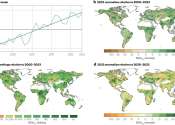Study shows climate change impact on China's dry–wet transition zones
Climate change is significantly altering bioclimatic environments in China's dry–wet transition zones, according to a recent study published in the Journal of Hydrology.

Climate change is significantly altering bioclimatic environments in China's dry–wet transition zones, according to a recent study published in the Journal of Hydrology.
Earth Sciences
5 hours ago
0
8

In the last several decades, large forest fires have increasingly threatened communities across the Mediterranean. Climate change is expected to make these fires larger, hotter, and more dangerous in the future. But fire ...
Environment
6 hours ago
0
3

California may be a leader in the fight against climate change, but the state is years, even decades, behind other states when it comes to granting environmental rights to its citizens.
Environment
7 hours ago
0
48

Fungal disease Fusarium head blight (FHB) is on the rise due to increasingly humid conditions induced by climate change during the wheat growing season, but a fundamental discovery by University of Adelaide researchers could ...
Molecular & Computational biology
9 hours ago
0
10

In the ongoing quest to track the progression of climate change, scientists frequently examine the state of our planet's vegetation—forests, grasslands, agricultural lands, and beyond.
Earth Sciences
Apr 25, 2024
0
9

New University of Minnesota research suggests "leaf glow" provides vital information on vegetation dynamics in Arctic and boreal ecosystems like Minnesota's forests and wetlands, which are among the fastest warming in the ...
Plants & Animals
Apr 25, 2024
0
13

Understanding why some people trust some scientists more than others is a key factor in solving social problems with science. But little was known about the trust levels across the diverse range of scientific fields and perspectives.
Social Sciences
Apr 25, 2024
0
408

Global biodiversity has declined between 2% and 11% during the 20th century due to land-use change alone, according to a large multi-model study published in Science. Projections show climate change could become the main ...
Ecology
Apr 25, 2024
0
28

As the climate changes, animals are doing what they can to adapt. Researchers from UBC Okanagan—which includes partners from Biodiversity Pathways' Wildlife Science Center, the Alberta Biodiversity Monitoring Institute, ...
Plants & Animals
Apr 25, 2024
0
52

A research team has demonstrated that gene-based breeding (GBB) offers a transformative approach to advancing plant and animal breeding, showing remarkable predictability, speed, and cost-effectiveness. The review highlights ...
Molecular & Computational biology
Apr 25, 2024
0
1
Climate change is any long-term change in the statistics of weather over periods of time that range from decades to millions of years. It can express itself as a change in the mean weather conditions, the probability of extreme conditions, or in any other part of the statistical distribution of weather. Climate change may occur in a specific region, or across the whole Earth.
In recent usage, especially in the context of environmental policy, climate change usually refers to changes in modern climate (see global warming). For information on temperature measurements over various periods, and the data sources available, see temperature record. For attribution of climate change over the past century, see attribution of recent climate change.
This text uses material from Wikipedia, licensed under CC BY-SA